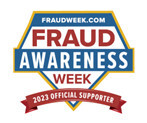Home » Insights »
Revenue Protection Requires Fraud Prevention
Fraud Awareness Week 2023
 When you consider that companies lose an estimated five percent of revenue annually due to fraud, staying alert and on top of trends is the first step in prevention.* In recognition of International Fraud Awareness Week, we’re sharing recent trends to be aware of so you can help protect your organization. Last year we reported Fraud Trends included in the Association of Certified Fraud Examiner’s 2022 Report to the Nations. This report is issued every two years so we’ll continue to keep you updated in the meantime. What’s more, our team of specialists stands ready to help you prevent, detect and remediate the effects of fraud.
When you consider that companies lose an estimated five percent of revenue annually due to fraud, staying alert and on top of trends is the first step in prevention.* In recognition of International Fraud Awareness Week, we’re sharing recent trends to be aware of so you can help protect your organization. Last year we reported Fraud Trends included in the Association of Certified Fraud Examiner’s 2022 Report to the Nations. This report is issued every two years so we’ll continue to keep you updated in the meantime. What’s more, our team of specialists stands ready to help you prevent, detect and remediate the effects of fraud.
Crypto – Fraudsters continue to find use of cryptocurrencies. Eight percent of fraud cases involved the use of cryptocurrencies, primarily to make bribes, pay kickbacks or to convert stolen funds or assets, according to the 2022 Report to the Nations. Aside from using crypto to help cover fraud, one of the most covered stories in the country right now involves the CEO and founder of cryptocurrency exchange FTX. The
allegations in this case stem from an alleged scheme by the CEO to misappropriate billions of dollars of customer funds.
Check fraud – One of the oldest scams around the world – check fraud – continues to plague organizations and individuals. These scams can be perpetrated by external third parties (some who simply steal checks from mailboxes) and internal parties. Schemes we have seen recently involved employees who were referred from temporary placement agencies without proper vetting. Not only is there a cost of the stolen funds, companies are then forced to divert resources to investigate and resolve the scheme.
Employee Retention Tax Credit (ERC) – The ERC is a payroll tax credit originally established by the CARES Act in 2020, related to eligible payroll paid in certain periods of 2020 and 2021. The IRS recently
announced that it will stop processing new amended payroll tax returns with ERC claims until “at least” the beginning of 2024 and slow the processing of current claims. This sudden change from routine processing is due to the fact that the IRS believes many of the filed ERC claims are likely ineligible, noting that tax professionals estimate that 95 percent or more of claims coming in recent months are ineligible as promoters continue to use aggressive marketing tactics. IRS Commissioner Danny Werfel stated that businesses should utilize a trusted tax professional and “not a promoter or marketer hustling to get a hefty contingency fee.” The IRS has intensified audit work and criminal investigations on promoters and businesses filing dubious claims. Additionally, due to the extremely high risk of erroneous claims, the IRS announced an unprecedented new
withdrawal program allowing employers to actually withdraw submitted ERC claims.
Awareness is the first step in prevention. Implementing the appropriate controls or hiring the right professionals to assist from the start will help you protect your organization rather than deal with the aftermath of a fraud. Remember – an ounce of prevention is worth a pound of cure.
PKF O’Connor Davies is a proud supporter of International Fraud Awareness Week and our specialists have the skills and resources needed to help prevent, detect and remediate the effects of fraud.
Companies lose an estimated 5% of their revenue annually due to fraud, according to Occupational Fraud 2022: A Report of the Nations.
Resources
Contact Us
If you would like to discuss how we can advise you on forensic financial matters, contact a member of your client service team or:
Jon Klerowski, CPA, CFE, ABV
Principal
781.937.5729 | jklerowski@pkfod.com
Brian McDonough, CPA, CFE
Principal
781.937.5362 | bmcdonough@pkfod.com
*Source: Occupational Fraud 2022: A Report to the Nations
 When you consider that companies lose an estimated five percent of revenue annually due to fraud, staying alert and on top of trends is the first step in prevention.* In recognition of International Fraud Awareness Week, we’re sharing recent trends to be aware of so you can help protect your organization. Last year we reported Fraud Trends included in the Association of Certified Fraud Examiner’s 2022 Report to the Nations. This report is issued every two years so we’ll continue to keep you updated in the meantime. What’s more, our team of specialists stands ready to help you prevent, detect and remediate the effects of fraud.
When you consider that companies lose an estimated five percent of revenue annually due to fraud, staying alert and on top of trends is the first step in prevention.* In recognition of International Fraud Awareness Week, we’re sharing recent trends to be aware of so you can help protect your organization. Last year we reported Fraud Trends included in the Association of Certified Fraud Examiner’s 2022 Report to the Nations. This report is issued every two years so we’ll continue to keep you updated in the meantime. What’s more, our team of specialists stands ready to help you prevent, detect and remediate the effects of fraud.
